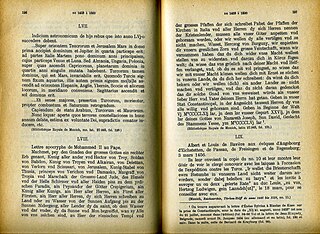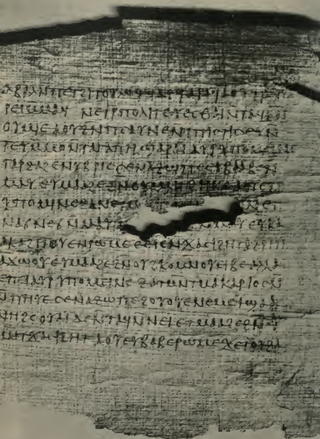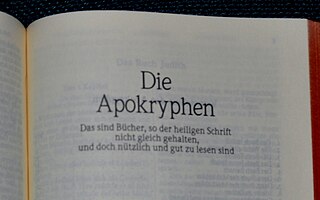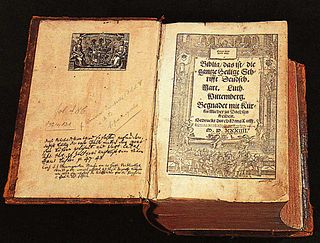Related Research Articles

Apocrypha are biblical or related writings not forming part of the accepted canon of Scripture. While some might be of doubtful authorship or authenticity, in Christianity, the word apocryphal (ἀπόκρυφος) was first applied to writings which were to be read privately rather than in the public context of church services. Apocrypha were edifying Christian works that were not considered canonical scripture. It was not until well after the Protestant Reformation that the word apocrypha was used by some ecclesiastics to mean "false," "spurious," "bad," or "heretical."
The deuterocanonical books are books and passages considered by the Catholic Church, the Eastern Orthodox Church, the Oriental Orthodox Churches, and/or the Assyrian Church of the East to be canonical books of the Old Testament, but which Jews and Protestants regard as apocrypha. They date from 300 BC to 100 AD, before the separation of the Christian church from Judaism. While the New Testament never directly quotes from or names these books, the apostles quoted the Septuagint, which includes them. Some say there is a correspondence of thought, and others see texts from these books being paraphrased, referred, or alluded to many times in the New Testament, depending in large measure on what is counted as a reference.

The King James Version (KJV), also the King James Version Bible (KJVB) and the Authorized Version (AV) is an Early Modern English translation of the Christian Bible for the Church of England, which was commissioned in 1604 and published in 1611, by sponsorship of King James VI and I. The 80 books of the King James Version include 39 books of the Old Testament, 14 books of Apocrypha, and the 27 books of the New Testament.

The Bishops' Bible is an English edition of the Bible which was produced under the authority of the established Church of England in 1568. It was substantially revised in 1572, and the 1602 edition was prescribed as the base text for the King James Version that was completed in 1611.

The Revised Version (RV) or English Revised Version (ERV) of the Bible is a late-19th-century British revision of the King James Version. It was the first officially authorised and recognised revision of the King James Version in Great Britain. The work was entrusted to over 50 scholars from various denominations in Great Britain. American scholars were invited to co-operate, by correspondence. Its New Testament was published in 1881, its Old Testament in 1885, and its Apocrypha in 1894. The best known of the translation committee members were Brooke Foss Westcott and Fenton John Anthony Hort; their fiercest critics of that period were John William Burgon, George Washington Moon, and George Saintsbury.

The New Revised Standard Version (NRSV) is a translation of the Bible in contemporary English. Published in 1989 by the National Council of Churches, the NRSV was created by an ecumenical committee of scholars "comprising about thirty members". The NRSV relies on recently published critical editions of the original Hebrew, Aramaic, and Greek texts. A major revision, the New Revised Standard Version Updated Edition (NRSVue), was released in 2021.
The Prayer of Manasseh is a short, penitential prayer attributed to king Manasseh of Judah.

The New Testament apocrypha are a number of writings by early Christians that give accounts of Jesus and his teachings, the nature of God, or the teachings of his apostles and of their lives. Some of these writings were cited as scripture by early Christians, but since the fifth century a widespread consensus has emerged limiting the New Testament to the 27 books of the modern canon. Roman Catholic, Eastern Orthodox, and Protestant churches generally do not view the New Testament apocrypha as part of the Bible.

The Acts of Paul is one of the major works and earliest pseudepigraphal series from the New Testament apocrypha also known as Apocryphal Acts. This work is part of a body of literature either about or purporting to be written by Paul the Apostle, including letters, narratives, prayers, and apocalypses. An approximate date given to the Acts of Paul is 100-160 AD. The Acts of Paul were first mentioned by Tertullian, who deemed the work to be heretical because it encouraged women to preach and baptize. The Acts of Paul were considered orthodox by Hippolytus of Rome but were eventually regarded as heretical when the Manichaeans started using the texts. The author of the Acts of Paul is unknown, but probably came from a Christian community in Asia Minor that revered Paul. The work does not use the canonical Acts of the Apostles as a source; instead it relies on oral traditions of Paul's missionary work. The text is primarily known from Greek manuscripts. The discovery of a Coptic language version of the text demonstrated that the text was composed of:

The Epistle of the Apostles is a work of New Testament apocrypha. Despite its name, it is more a gospel or an apocalypse than an epistle. The work takes the form of an open letter purportedly from the remaining eleven apostles describing key events of the life of Jesus, followed by a dialogue between the resurrected Jesus and the apostles where Jesus reveals apocalyptic secrets of reality and the future. It is 51 chapters long. The epistle was likely written in the 2nd century CE in Koine Greek, but was lost for many centuries. A partial Coptic language manuscript was discovered in 1895, a more complete Ethiopic language manuscript was published in 1913, and a full Coptic-Ethiopic-German edition was published in 1919.

The Acts of Peter and Paul is a pseudepigraphical 5th century Christian text of the genre Acts of the Apostles. An alternate version exists, known as the Passion of Peter and Paul, with variances in the introductory part of the text. Some versions have been written by a certain Marcellus, thus the anonymous author, of whom nothing further is known and is sometimes referred to as pseudo-Marcellus. The intended Marcellus is doubtless he who after the martyrdom takes the lead in burying St. Peter "near the Naumachia in the place called the Vatican."
The Jewish apocrypha are religious texts written in large part by Jews, especially during the Second Temple period, not accepted as sacred manuscripts when the Hebrew Bible was canonized. Some of these books are considered sacred in certain Christian denominations and are included in their versions of the Old Testament. The Jewish apocrypha is distinctive from the New Testament apocrypha and Christian biblical apocrypha as it is the only one of these collections which works within a Jewish theological framework.

The biblical apocrypha denotes the collection of apocryphal ancient books thought to have been written some time between 200 BC and AD 100. The Catholic, Eastern Orthodox and Oriental Orthodox churches include some or all of the same texts within the body of their version of the Old Testament, with Catholics terming them deuterocanonical books. Traditional 80-book Protestant Bibles include fourteen books in an intertestamental section between the Old Testament and New Testament called the Apocrypha, deeming these useful for instruction, but non-canonical. To this date, the Apocrypha are "included in the lectionaries of Anglican and Lutheran Churches". Anabaptists use the Luther Bible, which contains the Apocrypha as intertestamental books; Amish wedding ceremonies include "the retelling of the marriage of Tobias and Sarah in the Apocrypha". Moreover, the Revised Common Lectionary, in use by most mainline Protestants including Methodists and Moravians, lists readings from the Apocrypha in the liturgical calendar, although alternate Old Testament scripture lessons are provided.
The Old Testament is the first section of the two-part Christian biblical canon; the second section is the New Testament. The Old Testament includes the books of the Hebrew Bible (Tanakh) or protocanon, and in various Christian denominations also includes deuterocanonical books. Orthodox Christians, Catholics and Protestants use different canons, which differ with respect to the texts that are included in the Old Testament.
Pseudo-Abdias is the name formerly given to a collection of New Testament Apocrypha held by the Bibliothèque nationale de France and consisting of Latin translations in ten books containing several chapters. Each book describes the life of one of the Apostles.
Memoria refers to one of five canons in classical rhetoric.
Apostolorum may refer to:
A biblical canon is a set of texts which a particular Jewish or Christian religious community regards as part of the Bible.

A Protestant Bible is a Christian Bible whose translation or revision was produced by Protestant Christians. Typically translated into a vernacular language, such Bibles comprise 39 books of the Old Testament and 27 books of the New Testament, for a total of 66 books. Some Protestants use Bibles which also include 14 additional books in a section known as the Apocrypha bringing the total to 80 books. This is in contrast with the 73 books of the Catholic Bible, which includes seven deuterocanonical books as a part of the Old Testament. The division between protocanonical and deuterocanonical books is not accepted by all Protestants who simply view books as being canonical or not and therefore classify books found in the Deuterocanon, along with other books, as part of the Apocrypha. Sometimes the term "Protestant Bible" is simply used as a shorthand for a bible which contains only the 66 books of the Old and New Testaments.
Lots of the Apostles is the name of several texts used in Christian divination, based on the Acts of the Apostles 1:26, which describes how the Apostles cast lots to select a replacement for Judas Iscariot.
References
- ↑ Schneemelcher, Wilhelm; Wilson, Robert McLachlan (28 July 2005). New Testament Apocrypha. Westminster John Knox Press. p. 376. ISBN 978-0-664-22721-0.